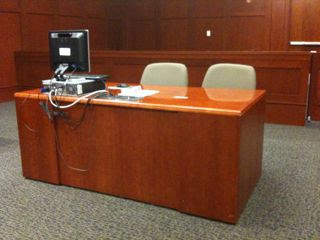“Why add a second chair to the table?”
Many trial lawyers don't want to share the glory, but a second chair can prove invaluable in complex cases, cases with large amounts of evidence, or cases with large numbers of witnesses. Here are three important issues you and your co-counsel should agree upon before adding a second chair to your trial:
1. Decide if your co-counsel will be an "active second" or a "silent second." Active second chair attorneys question witnesses, cross-examine opposing witnesses, and may even present the opening statement or closing argument. Silent second chair attorneys take notes, prepare exhibits, and wrangle witnesses outside of the courtroom. If you and your second haven't agreed upon what role they're supposed to play before trial, your co-counsel will quickly become frustrated as the trial proceeds.
 2. The first mate never publicly disagrees with the captain. You must present a unified front. Jurors can seeeverything in the courtroom, so if there's any disagreement between you and your second, at least one of the jurors will pick up on the disharmony. When that happens, the jurors will start focusing on you, rather than your case. Although you will ask for their opinions on case strategies or witness examination, your co-counsel needs to understand that your decisions will be the ultimate decisions in the case. Any disagreements need to be voiced before trial, because once you step inside the courtroom, everyone on your team needs to be on the same page.
2. The first mate never publicly disagrees with the captain. You must present a unified front. Jurors can seeeverything in the courtroom, so if there's any disagreement between you and your second, at least one of the jurors will pick up on the disharmony. When that happens, the jurors will start focusing on you, rather than your case. Although you will ask for their opinions on case strategies or witness examination, your co-counsel needs to understand that your decisions will be the ultimate decisions in the case. Any disagreements need to be voiced before trial, because once you step inside the courtroom, everyone on your team needs to be on the same page.
3. Only one lawyer may question a witness. A recent horror story I heard involved an experienced attorney and a less experienced second chair. The lead defense attorney had fully prepared to cross-examine the prosecution's star witness. He was chomping at the bit, waiting for the opportunity to dissect this witness. During direct examination, the witness mentioned something improper or irrelevant. Before the lead defense attorney could say anything, his co-counsel leapt from his seat and objected. The objection was sustained. Unfortunately, since co-counsel had spoken during the witness's testimony, the judge wouldn't let any other lawyer speak during the witness's testimony. The second chair attorney was obligated to cross-examine the witness. His cross-examination was a failure, and ultimately, his client was convicted. The lesson? Make sure you and your co-counsel agree upon who will be cross-examining each witness, or you could find yourself in a similar bind.
Even if you don't want to have a second chair attorney with you for the entire trial, you should always have someone sit with you during the jury selection process. Having someone else sit with you during jury selection frees you from your notes, allowing you to talk directly with the jurors. More importantly, your second will pick up on interactions between the jurors that you may miss, such as when you're talking with Juror #2 and don't see Juror #22 on the other side of the room, who is vigorously shaking his head in disagreement.
Source;www.TrialTheater.com

No comments:
Post a Comment